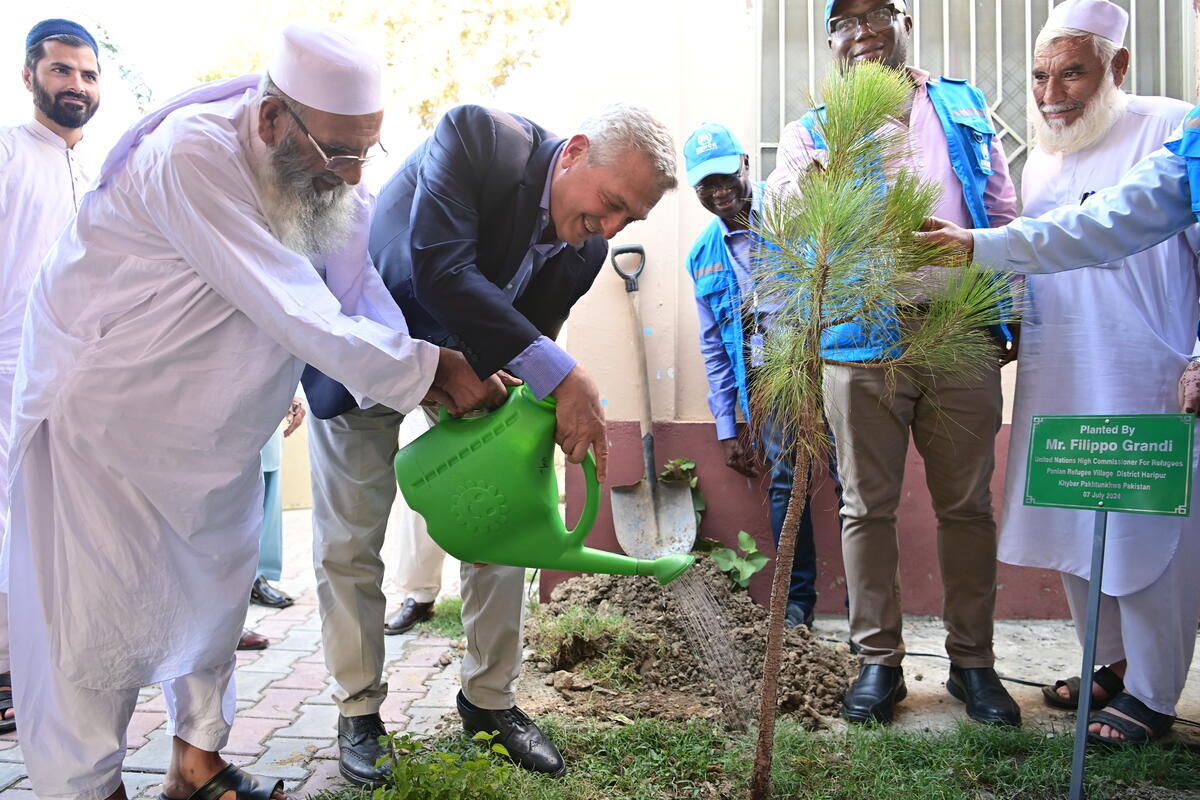Solution in sight for Afghans stranded at Pakistan border
Solution in sight for Afghans stranded at Pakistan border

CHAMAN, Pakistan, July 17 (UNHCR) - A solution could be in sight for several thousands of Afghan refugees stranded in Pakistan's border area, with more than 400 families saying they are willing to be moved to new settlements in southern Afghanistan.
"They want their representatives to go and make an assessment visit to the Kandahar area," said UNHCR Protection Officer Svjetlana Pejdah after meeting with the Afghan refugees stuck at Pakistan's Chaman border zone.
The UN refugee agency and the Afghan authorities are exploring the possibility of gradually relocating some of the refugees from the makeshift encampment at Chaman to new settlements in Zarey Dasht, in the Kandahar province of Afghanistan.
Once the refugees' representatives visit the proposed new settlements, Pejdah believes their favourable views could help spur Chaman's stranded Afghans to return to their homeland. "Maybe it will open a floodgate, maybe interest [in repatriation] will be raised," she said.
UNHCR site planners and water engineers plan to make various improvements in the Zarey Dasht site over the next weeks, Pejdah added.
In all, more than 25,000 Afghan refugees - comprising some 6,000 families - are stranded in the "waiting area" at Chaman, which is just inside Pakistani territory across from Afghanistan, but short of the line staffed by Pakistani authorities. The Afghans have been there since February, when the Pakistani government closed its borders to new arrivals. Previously, UNHCR had been able to relocate Afghans to new refugee camps in Pakistan established for those fleeing the post-September 11 mayhem.
Living conditions in Chaman, with dust storms and scorching temperatures of over 40°C, are harsh. Pakistan allowed UNHCR to provide tents to the most desperate refugees only in June. All water must be trucked in, and the supply still does not meet the minimum requirement.
"We have established nine water points in the waiting area to cater for the daily water needs of refugees," said the UNHCR's Pejdah. She added that the refugee agency was trying to get three more water bladder tanks to cope with daily needs.
Aid agencies are struggling to cope with the situation, while providing basic facilities to the refugees. Apart from food distribution, relief workers also oversee water, health, sanitation and community services.
Ayesha Bibi, who represents women refugees in a new operational cell that reviews refugees' problems regularly, said, "Though food distributions and provision of water and shelter by aid agencies have improved living conditions, we are still engaged in a tough fight to survive."
There has also been concern about harassment in the area. Pejdah said UNHCR would try to ensure representatives of the stranded Afghans could attend meetings with aid agencies. "We are in the process of issuing 'to whom it may concern' letters so that the refugee elders face no problems while accessing the meeting areas inside Pakistan," she said.
Refugees also reported facing harassment from Afghan soldiers, saying that soldiers entered the area, threatening refugees and aid workers. In response, Pakistani security forces have started local patrols.
"Pakistani border officials have been very co-operative in this regard. They have provided full assurances that no such matter would arise in future," said UNHCR's Pejdah.
Many of the refugees stuck at Chaman had fled the effects of the long drought devastating much of Afghanistan. Others are ethnic Pashtuns who said they were forced from their homes in northern Afghanistan by bandits or anti-Taliban groups, or simply fled fearing violence.
UNHCR hopes that it can find a solution for the Afghans stuck at Chaman, including possibly assisting some people to return to areas in Afghanistan where they feel safe. More than 2,100 people have so far opted to repatriate from the zone, mostly to southern Afghanistan.








